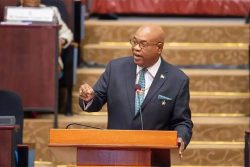PPP executive Zulfikar Mustapha says that the defence submitted by the Attorney General in the legal challenge to the appointment of retired judge James Patterson as Guyana Elections Commission (Gecom) Chairman clearly shows that his selection was unconstitutional.
“It is clear that not only is the appointment… lacking in constitutionality and legality and Mr. Justice Patterson himself lacking in integrity, but attempts to defend both the appointment and him are themselves lacking in veracity, credibility and substance,” he says in an affidavit in reply, which was prepared by his attorney, Anil Nandlall, on Tuesday.
Last month, Mustapha filed an application in the High Court asking for Patterson’s appointment to be overturned.
On November 10, an affidavit in defence, which was sworn to by Solicitor General Kim Kyte on Attorney General (AG) Basil Williams’ behalf, was submitted. Kyte, in defending the legality of the appointment and arguing for the dismissal of challenge, stated that the president acted within his constitutional power when he made the unilateral selection and that he cannot be legally compelled to choose from the nominees he rejected.
Mustapha’s application noted that Patterson is a reverend, that is, a Christian activist/leader, although the criteria Granger had set out for Opposition Leader Bharrat Jagdeo precluded nominees who were activists in any field. It also noted that he is a member of the Advisory Council on the Prerogative of Mercy, appointed by the President; an advisor to the Attorney-General and Minister of Legal Affairs appointed by the President, the Attorney-General or someone in the President’s Government and was paid eight hundred thousand dollars ($800,000) per month for that post; and appointed by the President to head a Commission of Inquiry into the prison fire at Georgetown; and part of a panel to review applications for the positions of Chief Justice and Chancellor of the Judiciary.
In his affidavit in reply, Mustapha said that he has taken note of the denial of the points by Kyte’s response although the public records show otherwise.
He said that he has also taken note of the denial that Patterson was at the funeral of former president Desmond Hoyte although this information is contained on the PNC’s website and that Patterson is a member of a social media group under the name and style of “Rally Around the People’s National Congress Group,” although a printout of said membership was attached to the application filed.
Mustapha said that although Kyte’s response has denied that Patterson said that he was only informed of the impending appointment hours before the swearing in, statements widely publicised in the local print and electronic media confirmed that he had indeed said so.
Though Kyte’s affidavit admitted that there was an agreement between Granger and Jagdeo for the establishment of a high-level team representing both sides to resolve the appointment in the event that the third list was rejected, she had stated that any such agreement was void ab initio, since agreements to contract out of the provisions of the Constitution would be ultra vires, null and void.
However, noting that he intended to convey in his application a commitment by the president to the nation that he will bind himself to a consensual process with the Leader of the Opposition as contemplated by the spirit of Article 161 of the Constitution, Mustapha argued that the president is enjoined by Article 161 (2) to act in accordance with its terms and spirit and not in accordance with his own nebulous conception of “the public interest.”
Kyte had also contended that Mustapha’s application was “absurd, misconceived and void of legal reasoning and merit.” She asserted that the president does not have to give reasons for rejecting any of the nominees for the post and that some of the arguments made against Patterson’s selection are disingenuous, as they would also mean that the nominations of Christopher Ram and Joe Singh by Jagdeo were improper. “…His Excellency the President cannot be directed to choose a person from the lists of eighteen which he specifically rejected,” she argued. “I will contend that for the judicial arm to entertain and grant such an application would encroach on the very principles of separation of powers and the spirit and intendment of the Constitution and an affront to the rule of law. I will further contend that such a direction would be tantamount to a usurpation of the powers of the executive arm of Government by the judiciary who cannot govern,” she added.








